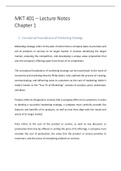Notizen
MKT 401 Marketing Strategy Chapter 1: A Comprehensive Lecture Notes
Welcome to this comprehensive collection of lecture notes on marketing strategy course (MKT 5! These notes cover a wide range of essential concepts and techniques, including target market segmentation, the marketing mix, SWOT analysis, competitive analysis, customer personas, brand messaging, and m...
[ Mehr anzeigen ]





